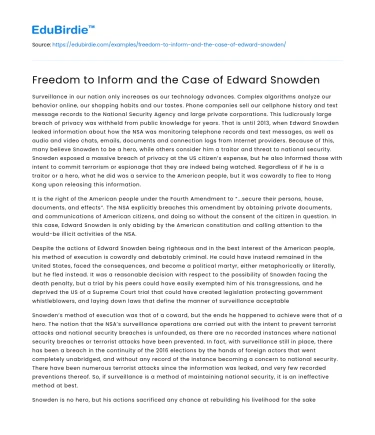Surveillance in our nation only increases as our technology advances. Complex algorithms analyze our behavior online, our shopping habits and our tastes. Phone companies sell our cellphone history and text message records to the National Security Agency and large private corporations. This ludicrously large breach of privacy was withheld from public knowledge for years. That is until 2013, when Edward Snowden leaked information about how the NSA was monitoring telephone records and text messages, as well as audio and video chats, emails, documents and connection logs from Internet providers. Because of this, many believe Snowden to be a hero, while others consider him a traitor and threat to national security. Snowden exposed a massive breach of privacy at the US citizen’s expense, but he also informed those with intent to commit terrorism or espionage that they are indeed being watched. Regardless of if he is a traitor or a hero, what he did was a service to the American people, but it was cowardly to flee to Hong Kong upon releasing this information.
It is the right of the American people under the Fourth Amendment to “...secure their persons, house, documents, and effects”. The NSA explicitly breaches this amendment by obtaining private documents, and communications of American citizens, and doing so without the consent of the citizen in question. In this case, Edward Snowden is only abiding by the American constitution and calling attention to the would-be illicit activities of the NSA.
Save your time!
We can take care of your essay
- Proper editing and formatting
- Free revision, title page, and bibliography
- Flexible prices and money-back guarantee
Despite the actions of Edward Snowden being righteous and in the best interest of the American people, his method of execution is cowardly and debatably criminal. He could have instead remained in the United States, faced the consequences, and become a political martyr, either metaphorically or literally, but he fled instead. It was a reasonable decision with respect to the possibility of Snowden facing the death penalty, but a trial by his peers could have easily exempted him of his transgressions, and he deprived the US of a Supreme Court trial that could have created legislation protecting government whistleblowers, and laying down laws that define the manner of surveillance acceptable
Snowden’s method of execution was that of a coward, but the ends he happened to achieve were that of a hero. The notion that the NSA’s surveillance operations are carried out with the intent to prevent terrorist attacks and national security breaches is unfounded, as there are no recorded instances where national security breaches or terrorist attacks have been prevented. In fact, with surveillance still in place, there has been a breach in the continuity of the 2016 elections by the hands of foreign actors that went completely unabridged, and without any record of the instance becoming a concern to national security. There have been numerous terrorist attacks since the information was leaked, and very few recorded preventions thereof. So, if surveillance is a method of maintaining national security, it is an ineffective method at best.
Snowden is no hero, but his actions sacrificed any chance at rebuilding his livelihood for the sake of the American people. Thanks to him informing the American public about the actions of the NSA, we can now pressure the government to reform surveillance laws and take steps as citizens to secure our own private affairs online. Perhaps these events and any events similar to this in the future will help us define our Fourth Amendment right, and whether it should be a human right to have privacy.






 Stuck on your essay?
Stuck on your essay?

